|
|
The Blakely Burl Tree Project: The
Story
|
The Blakely Burl Tree Project:
From The Ground Up
by Terry Martin |
REFLECTIONS
As a woodworker myself, I’m
occasionally caught up in the thrill of the flying sawdust and the scent of
freshly cut lumber, but the very best thing about my role as writer for the BBTP
is the chance to watch people closely, especially when they are too busy to
notice I am watching. Of course, in this case watching other people work is only
an honorable occupation if I end up with something worthwhile to say about them.
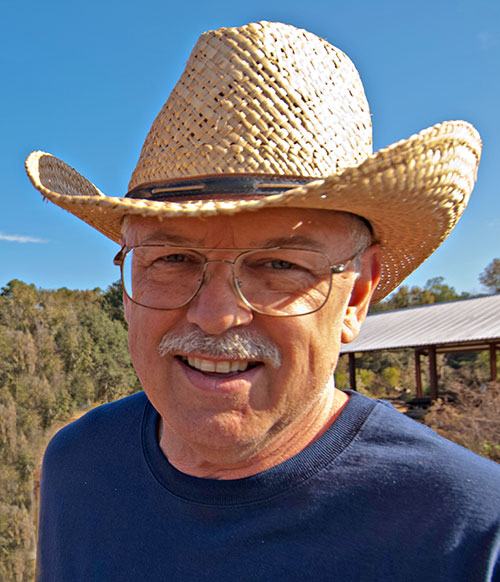
Terry Martin at Cross Sawmill, Iron City, GA. Photo:
Mark Lindquist
I’ve met so many interesting characters over the last week that I find it hard
to keep up, but on our second day at the sawmill, there is relatively little
distraction because there are no people passing by every few minutes, no
speculation about million-dollar trees, and, sadly, no sweet rolls from Heather.
The noise of the mill drowns conversation, while the steady rhythm of sawing the
tree offers space for private thought. Mark and Gary continue their verbal
jousting about how and where to cut, so I step back and think about the people I
have been watching for several days.
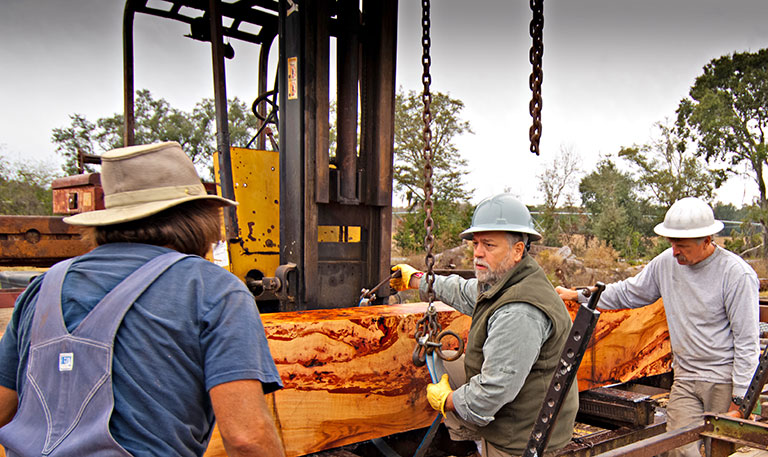
Gary Stevens (left) and Mark Lindquist (center) working with sawmill owner Steve
Cross. Photo:
Chris Smith
There is no doubt that Mark is an obsessive man, but it is in the best meaning
of the word. His wish to guide every step of the Project comes from a
determination to get it all right, and he has succeeded. We have hardly deviated
from his preplanned timetable and he has been on top of every stage of the work.
However, the stress has been very high for him and he has pushed himself to the
limit every day. When the interior of the tree was finally revealed, Mark
visibly relaxed. He had staked his reputation on his predictions about this
tree, something few woodworkers would have done, but he was proven right.
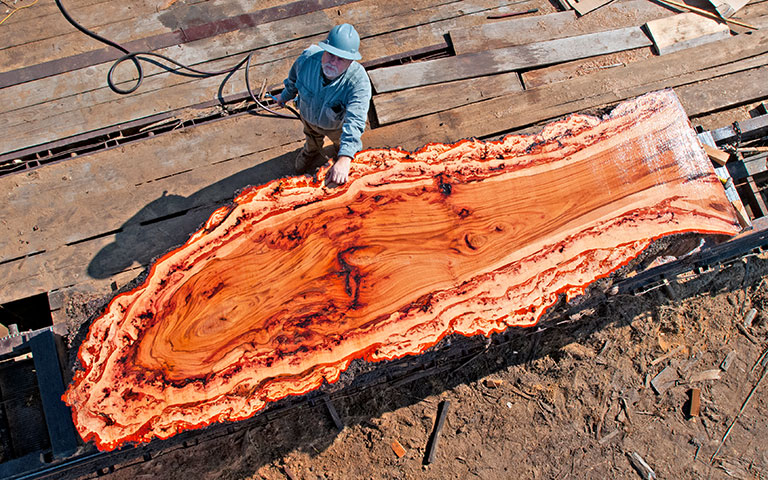
Blakely Burl Tree Project Director Mark Lindquist with the main center cut of
the burl tree log. Photo:
John McFadden
Now, at the sawmill, Mark has a chance to enjoy the work and he bounces around,
full of ideas, full of excitement. I know that when he was young, Mark and his
father Mel used to do incredibly exciting things for a boy. They built log
cabins in the woods, Mark wielded chainsaws from the astonishingly young age of
ten, and his father’s early trust in him fostered remarkable self-confidence
that has followed him throughout his adult life. His lifetime of experience
working with burls was tailor-made preparation for this job.
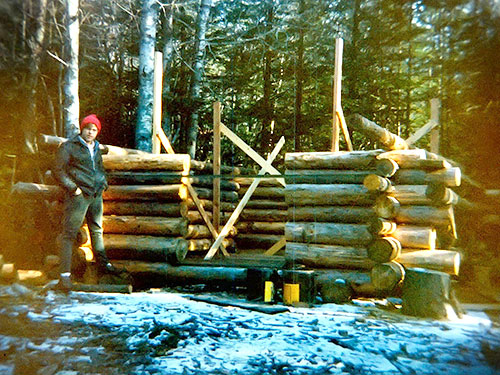
Mark Lindquist in the upstate New York Adirondacks with a cabin he and his
father Mel built on their land during the late 50's through early sixties. Photo:
Mel Lindquist
When Mark first began to assemble the BBTP team, I suspect Gary was the first on
the list. Gary had already been working in wood for twenty years when he
met Mel and Mark Lindquist. Gary inherited his can-do work ethic from his
grandfather, who was a carpenter, and his father, who was a blacksmith.
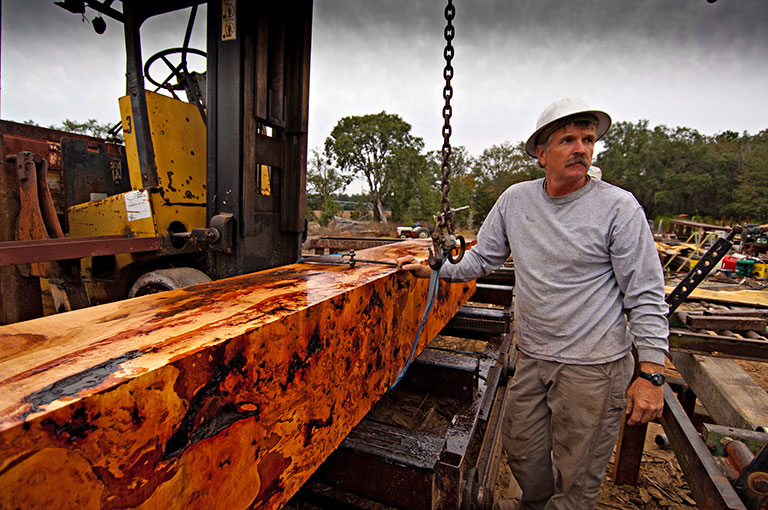
Gary Stevens at Cross Sawmill. Photo:
Mark Lindquist
Gary had already been working in wood for twenty years when he met Mel
and Mark Lindquist. Gary inherited his can-do work ethic from his grandfather,
who was a carpenter, and his father, who was a blacksmith. That’s why he
recognized kindred spirits in Mark and Mel. Gary likes to acknowledge the
influence both of the Lindquists had on him. Watching him for over a week, I
have learned that he is incapable of sitting still when there is something to be
done, but even when Gary has been cross-eyed with exhaustion he has stayed
upbeat. I don’t recall ever hearing a negative word from him.
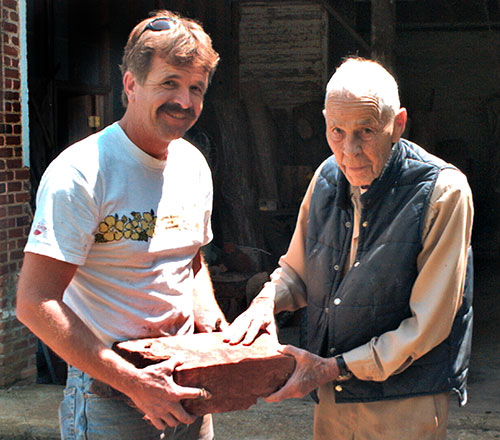
Gary Stevens (left) with woodturning pioneer Mel Lindquist at Lindquist
Studios in Quincy, FL 1998. Gary Stevens was studio assistant to the
Lindquists for several years.
Photo:
Mark Lindquist
The more I think about how hard everyone has worked, the more impressed I am.
John McFadden has been continually popping up in the most unexpected places,
climbing machinery or throwing himself down on the ground to look up at the
image he wants to catch. Despite this, John never gets in the way of operations.
I ask him how he does it. “I don’t have to try,” he says. “When I have a job to
do through the camera, everything sort of narrows down for me. To get
interesting pictures I have to become invisible, so I try to get people to trust
me and then sort of forget that I’m there with the camera. That way I get
natural behavior. Still, there are moments when I don’t want them to forget,
like when a chainsaw is being used—then it’s ‘Hey, I’m here!’”
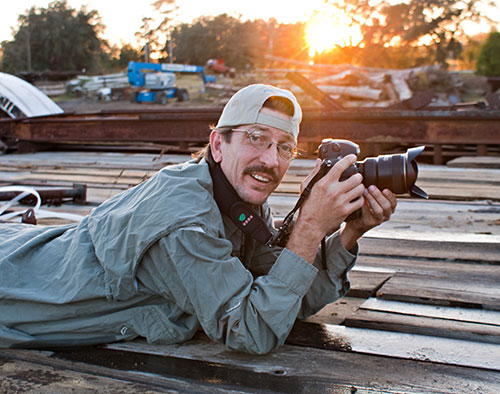
Photographer John McFadden at Cross Sawmill, Iron City, GA Photo:
Terry Martin
John is not a
large man, but every time I see him he is carrying packs of camera gear, hauling
computers, scrambling, scrambling everywhere. This morning as we headed out to
the mill, I helped John with his cameras. It was a real shock when I hefted his
backpack as it must have weighed at least eighty pounds.
Every night he works
late, helping lay down computer backups of the film Greg has taken that day.
Often he calls me over to see a still image he is particularly proud of. I
recall that at that first welcoming dinner in Blakely I had told the gathered
residents they would be “gobsmacked” by the images John and Mark would create.
The images John shows me are confirmation of this. The final results are
something I am looking forward to.
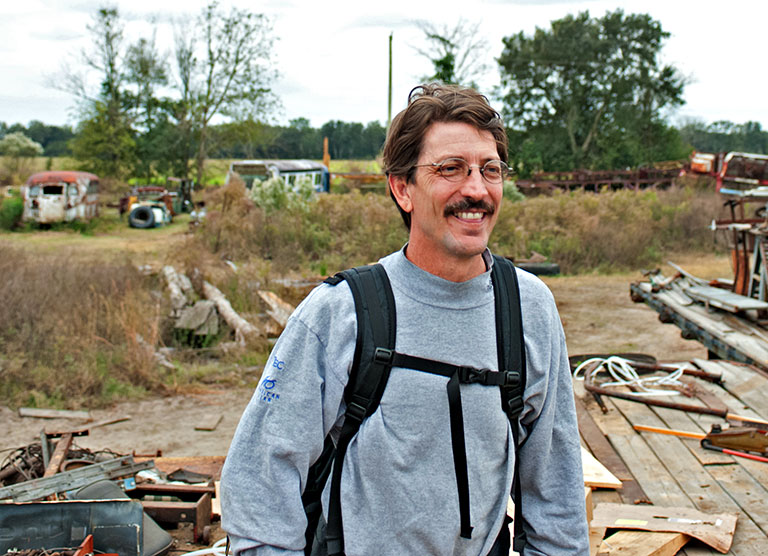
Photographer John McFadden at Cross Sawmill, Iron City, GA Photo:
Terry Martin
While I am sitting on the shuddering deck of the Super Ax thinking about how to
represent all of this work in writing, Chris Smith joins me. With somebody so
quiet it is easy to underestimate his achievements and I think back to when I
visited Chris in his furniture studio in Florida before we came to Blakely.
Chris has chosen a calm life in a house and studio surrounded by woods. It is an
island of quiet contemplation, filled with his own woodwork.
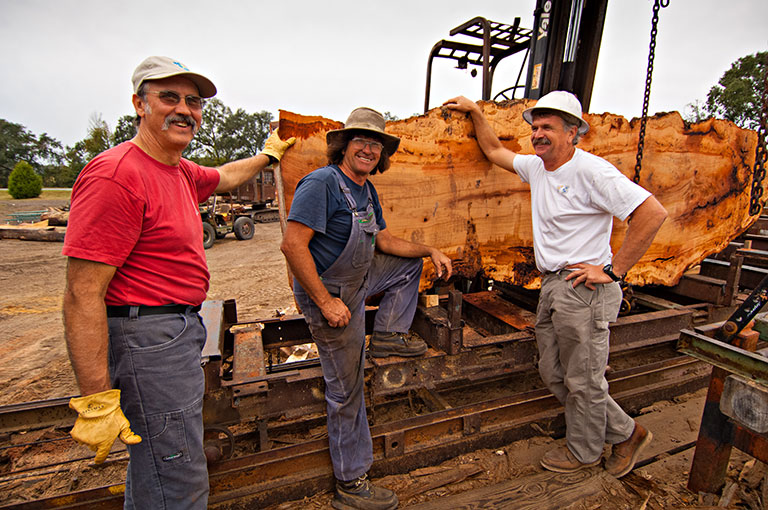
Chris Smith (left) with Steve Cross (center) and Gary Stevens (right).
Photo:
Mark Lindquist
Every piece he has
made confirms how much he understands the essential nature of wood and of the
tree, and he uses this knowledge to express a simple philosophy of life. I can’t
shake the image of a beautiful hand-towel rack that I saw in his bathroom. It
was an unpretentious piece of jointed branch that seemingly grew out of the
bench top, arching over to allow the towel to be draped lightly on it. It helps
me understand why the pallets that Chris made for storing the wood are so well
made. As he sits beside me now, covered in sawdust and with sweat soaking his
shirt, I see that gentle art can require hard work, and that Chris is up to the
job.
Later I walk up to the house and find Stephanie, Steve’s wife. She is driving
posts in the ground to build a fence to keep the wildlife out of their vegetable
patch. We compare experiences of lost crops, me to Australian possums, her to
roaming deer. While we are talking Steve rushes by with a broad grin on his
face, apparently on some urgent errand and I see her smiling as he passes.
“Steve’s in his element right now,” she says. “He really loves to share his
passion with everyone and because he cuts such large pieces, nobody could have
dreamed up a more perfect project for him.”
I ask her about their life here and she laughs:
“This is just bliss. I couldn’t dream up a better place to live and a more
amazing man. He’s thoughtful and he just loves the children. He doesn’t know how
to say no to them or raise his voice. It’s not just for the kids, it’s for me
too. He is an amazing, wonderful husband and father.”
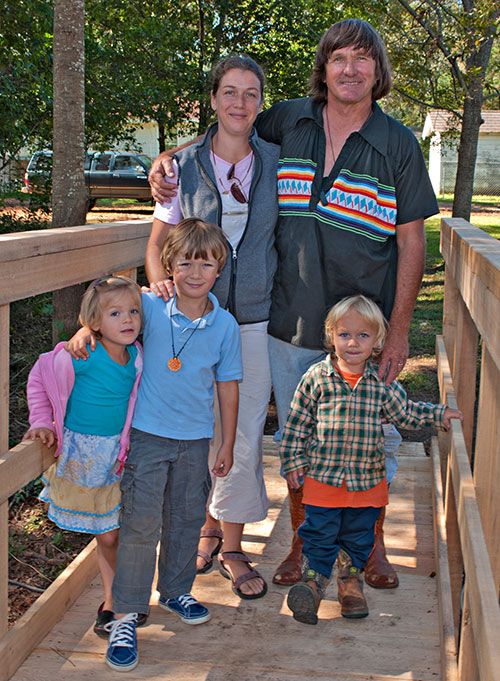
The Cross Family Photo:
John McFadden
Nearby, the three children are running here there and everywhere. The two boys,
Steven and Oliver, and daughter Julia are a home-schooled brood who live
surrounded by woods, an extended dog and cat family, a child's paradise of junk
and machinery, and loving parents whose life is dedicated to giving them the
richest experience possible. All of this is as far from the techno-world of the
average city kid as you can imagine.
The never-tiring wood team keeps sawing and a whole day passes, from the glory
light of early sunrise, to the gentle tones of a fall sunset. In anticipation of
this perfect light, John and I sneak away to take photographs along a beautiful
creek near Steve’s home. As we work our way along the banks of the creek to get
the best light on the water, I stop to look around. The huge cypress trees push
weird, rounded knees of wood up through the wet soil, and the trees arch
overhead. Swaths of Spanish Moss create a translucent curtain that the light
bleeds through to create an other-worldly atmosphere. As John disappears around
a bend in the creek, I am left alone, surrounded by the murmur of the stream.
Not for the first time, I wonder how I came from the other side of the world to
be here.
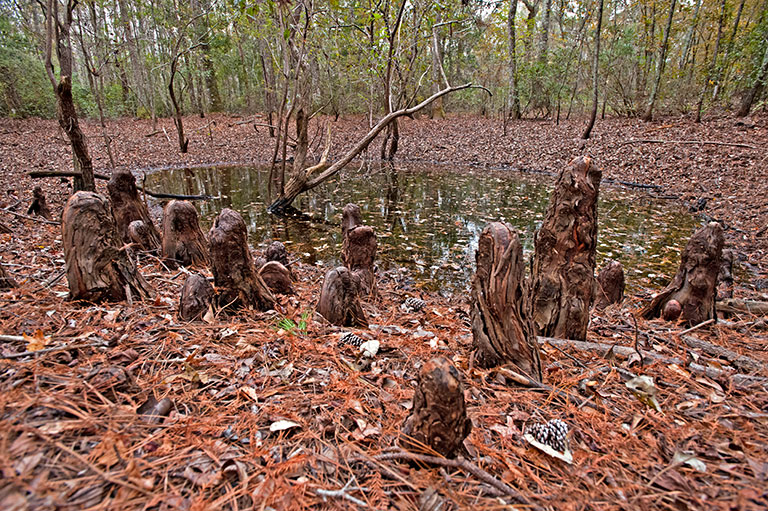
Cypress knees near Steve Cross's house.
Photo:
John McFadden
|
|